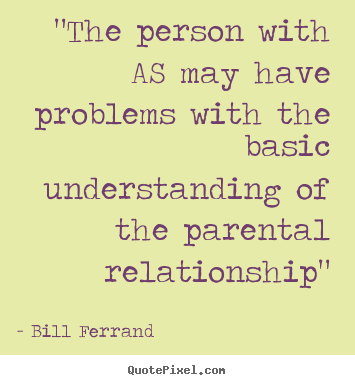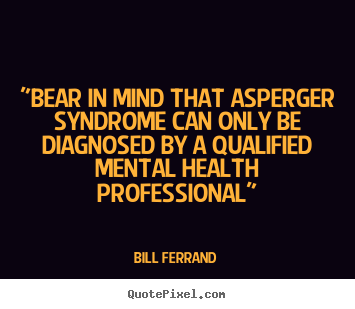Asberger Syndrome and Couples
Asperger Syndrome (AS) is a disorder on the autism spectrum that affects children as well as adults. With this disorder people face extreme difficulty in social interactions as they have limited abilities for social engagement. The disorder often goes undiagnosed, as those with Asperger may have average or even above-average intelligence, and many are able to develop adequate adaptive coping skills that serve them well until they are confronted by their most challenging social relationship–with a partner or spouse.
Asberger Syndrome and Relationships
A romantic relationship is especially challenging for those living with the disorder, as the affected person may appear to lack empathy and have difficulty in understanding their partner’s emotions and needs for affection.
The frustration and distress that results sends many into couple or relationship counseling when they are unable to resolve the conflicts that commonly arise from the disorder.

10 Signs of Asberger Syndrome
If any of this sounds familiar, you may not be dealing with a lack of caring or commitment in your relationship. To be blunt, Asperger Syndrome could be the culprit. While there may be many reasons for relationship problems, the following is a list of common characteristics of people living with Asperger Syndrome:
- People with AS may prefer or demand to spend more time alone or with solitary activities than people without AS.
- There is an inability for a person with AS to recognize social or non-verbal cues, such as boredom or even signs of stronger emotions such as sadness or anger.
- As a result of the above a person with AS seem emotionally distant.
- They may seem to lack of empathy or be unable to hear of understand their partner’s emotional needs.
- They may follow rigid routines and may become easily frustrated or angry when these are interrupted or don’t go according to plan.
- There is an inability to maintain appropriate eye contact during social interaction.
- A person with AS may have an intensely unusual focus on a particular topic or hobby, such as trains or sports statistics.
- Strong sensory preferences or reactions to specific tastes, smells, or textures are common in those with AS.
- They have difficulty in expressing their own emotions.
- In conversations, they may monologue, or focus more on talking about themselves, and areas of interest to them, and are unable to engage in a responsive dialogue with another person.
When one partner is affected with this disorder it disturbs the whole relationship, as that person is not able to effectively adjust with their partner. It is common for there to be issues in expressing sexual desires, which can cause persistent issues in the bedroom.
Other Complications
People living with AS, are at a higher risk of developing depression and anxiety disorders and have trouble balancing their mental wellness. Issues may worsen when the couple has children, as a child necessarily changes the relational dynamic.
The person with AS may have problems with the basic understanding of the parental relationship and struggle with meeting the child’s needs. In many cases, this can cause relational friction – and sometimes a breakup.
The non-AS partner often complains that their partner is selfish and puts himself first. Partners with those who have AS may develop as sense of loneliness; feel deprived of affection and notice that interactions have become increasingly difficult.

Bear in mind that Asperger Syndrome can only be diagnosed by a qualified mental health professional. Should this diagnosis occur, it is generally agreed upon that 3 specific things need to take place in order for the couple to move forward in a meaningful and loving way.
- Acknowledgement: It is important that both partners acknowledge the diagnosis and recognize the impact is having on the relationship. Many find relief in having an explanation to the difficulties they have experienced.
- Motivation: Both partners will need to work diligently to learn and acquire coping strategies and make changes in their behaviors.
- Counseling: Seeking relationship counseling from a counselor who is knowledgeable about the disorder and how it impacts a relationship.
 Additionally, many have sought social support from other couples that share their experiences in living with Asperger Syndrome. Since both partners in the relationship may be facing feelings of isolation, it is empowering to understand that they are not alone.
Additionally, many have sought social support from other couples that share their experiences in living with Asperger Syndrome. Since both partners in the relationship may be facing feelings of isolation, it is empowering to understand that they are not alone.
This may be found through local, in person support groups, or in online communities, such as the Asberger/Autism Network.
Asberger Syndrome Book
An excellent book on the topic is The Partner’s Guide to Asperger Syndrome by Susan Mareno, Marcy Wheeler, and Kealah Parkinson, which covers topics including coping with stress, parenting, and how to use the positive qualities of AS to benefit the quality of the relationship.

Thanks for visiting the Couples Counseling Center in Chicago online! Please Like us on Facebook, Circle us on Google+ and Share on Twitter!


